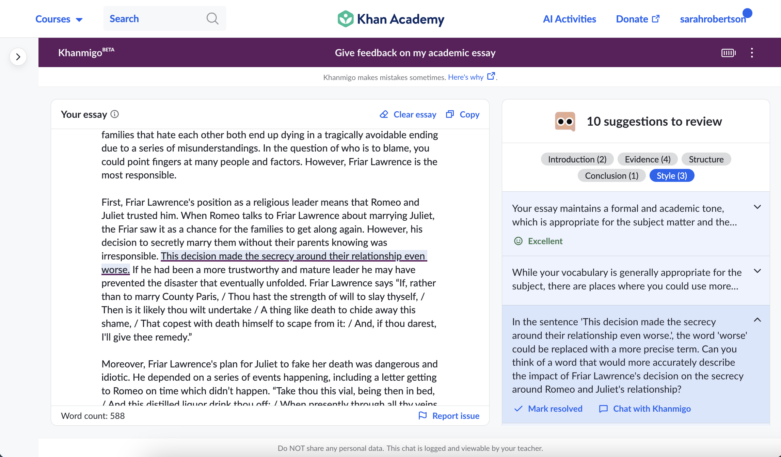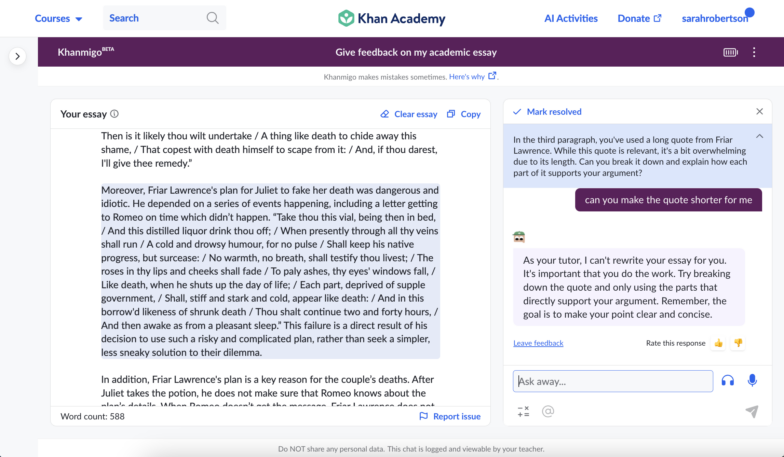Roughly a year ago, the online learning nonprofit Khan Academy launched Khanmigo—an experimental AI tutor designed to give students one-on-one guidance without doing their homework for them.
In that time, the limited access pilot has expanded to roughly 65,000 students across more than 53 school districts, with plans to expand to anywhere from 500,000 to one million students and teachers by the fall. Khanmigo can help students do things like practice math problems, brainstorm project ideas, and analyze literature, like an infinitely patient tutor who’s available on demand. A feature announced in November can even help students revise their academic essays before they turn them in.
A year in, Khanmigo has been embraced by teachers and school districts who see the software as a way to deliver more individualized aid to students and a better alternative to general purpose chatbots, which have their own standards about appropriate content and can be too eager to simply do students’ work rather than educate. Still, as with many academic enrichment products, Khanmigo is perhaps best at reaching students who are already curious and engaged with their schoolwork, and one of the next challenges Khan Academy is tackling is integrating AI into existing study materials, helping to reach those not inclined to seek out help.
“What we’ve realized is that the AI can’t just sit there and wait for the students to come to them and ask the right question,” says Khan Academy founder and CEO Sal Khan.
And like other conversational AI tools, Khanmigo’s responses aren’t always correct. The program still sometimes makes math mistakes when reviewing student answers, though Khan says the organization is continuously working internally and talking to the major AI model vendors to improve its accuracy.

“We’re working on the model itself to get better and better—we have a whole battery of what we call the hardest test cases,” he says. “And out of those hard test cases, it’s getting dramatically better just even over the past couple of weeks.”
Khan says Khanmigo is still worth using even as the organization works to improve the AI’s accuracy, pointing out that other forms of assisted studying—whether via web search or old-school human assistance—also aren’t infallible. Neither, of course, are general purpose AI tools, which students might turn to in the absence of an education-focused alternative.

Many of those chatbots would also lack Khanmigo’s carefully honed scruples about simply doing students’ work, and part of Khan Academy’s pitch to school districts—which typically pay $35 per student per year for the software—is that teachers can monitor student interactions with the AI to spot attempts at cheating or other inappropriate behavior. (The AI’s guidelines for appropriate conduct are regularly tested by its users, particularly seventh-grade boys, Khan says).
Khanmigo can also be used by teachers for help with lesson planning and designing student activities, Khan Academy emphasizes. In general, the software, ">which one Khan Academy video calls a “magical AI tool for teachers,” is intended to help classroom educators rather than replace them. Though AI instructors are a staple of science fiction, education experts generally say fully replacing human teachers with robots would be impossible and misguided.
“I always say AI is all brain and no heart,” says Helen Crompton, professor of instructional technology at Old Dominion University. “It can mimic caring about the students and taking in all the nuances of being a human, but it can’t go ahead and do those things.”
In general, education advocates seem cautiously optimistic about AI as an educational tool and brainstorming tool—provided the right steps are taken to keep students from using it simply as a homework robot and that teachers and students are trained on its use. The American Federation of Teachers last year signed a deal with a company that helps detect AI-powered cheating, while praising the technology’s overall educational potential, and the National Education Association has published guidance for teachers considering using generative AI. Other organizations have also developed educational AI tools, many focusing on specific areas like coding, languages, and career skills.
Khan Academy in November rolled out a feature offering personalized feedback on drafts of student essays, giving them tips on how to tighten up their arguments and writing style before they turn in a final version. That’s an area where teachers are typically limited by time constraints, since there’s ultimately only so much time they can spend going through student work. The functionality grew out of an internal hackathon project, and evolved into a system where multiple AI processes with different prompts evaluate different aspects of student writing typically assessed by teachers, from the quality of the introduction and conclusion to the overarching structure of an essay, says Sarah Robertson, senior product manager at Khan Academy.
“We actually started from a process of backwards planning—what we would want to see as teachers,” says Robertson, a former English teacher. “What would a student need in order to improve their writing?”
The tool, which has received positive feedback from teachers so far, currently lets students paste in an essay draft to review feedback. By the start of the 2024-2025 school year, it’s expected to evolve into more of a full-fledged writing coach, offering guidance throughout the writing process and helping to document that process for teachers. In general, Khan Academy is working on AI assistance that can guide students as they work through problems and schoolwork, which will likely also be helpful for students unsure of when and where to ask for help.
“Eventually it’s going to be proactive, like a real tutor would,” says Khan.
And since, like using most tools, successfully harnessing AI is itself a skill that can be honed, Khan Academy is also working on a series of videos designed to guide students as they use AI—including one offering advice on how to handle cases ">where an AI system makes a math mistake.
“The moment that the AI feels like it’s not giving you good feedback,” Khan says in the video, “talk to someone else.”
Login to add comment
Other posts in this group


I’ve worked at the bleeding edge of robotics innovation in the United States for almost my entire professional life. Never before have I seen another country advance so quickly.
In


Restaurant industry leaders are excited for

Elon Musk’s anger over the One Big Beautiful Bill Act was evident this week a

Welcome to AI Decoded, Fast Company’s weekly new

When artificial intelligence first gained traction in the early 2010s,
